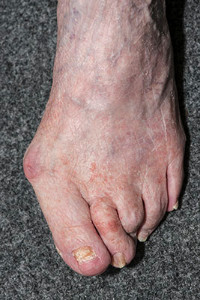 A protruding bone at the base of the big toe is referred to as a bunion. There are common symptoms that are associated with this condition. These typically include calloused and hard skin on top of the bunion, and swelling as a result of wearing shoes. Bunions are known to be caused by genetics, and many patients may develop this uncomfortable condition from wearing shoes that do not fit properly. There are several treatment options that may be effective, including wearing orthotics, taking painkillers, or using bunion pads. For severe bunions, surgery may be a viable option, if permanent removal of the bunion is warranted. There are measures that can be implemented that can help to prevent this condition from occurring. These include wearing shoes that have adequate room for the toes to move freely, and to avoid wearing high heels. If you believe you may have bunions, it is suggested that you seek the counsel of a podiatrist who can properly diagnosis and treat this condition.
A protruding bone at the base of the big toe is referred to as a bunion. There are common symptoms that are associated with this condition. These typically include calloused and hard skin on top of the bunion, and swelling as a result of wearing shoes. Bunions are known to be caused by genetics, and many patients may develop this uncomfortable condition from wearing shoes that do not fit properly. There are several treatment options that may be effective, including wearing orthotics, taking painkillers, or using bunion pads. For severe bunions, surgery may be a viable option, if permanent removal of the bunion is warranted. There are measures that can be implemented that can help to prevent this condition from occurring. These include wearing shoes that have adequate room for the toes to move freely, and to avoid wearing high heels. If you believe you may have bunions, it is suggested that you seek the counsel of a podiatrist who can properly diagnosis and treat this condition.
If you are suffering from bunions, contact one of our podiatrists of Riznyk Podiatry. Our doctors can provide the care you need to keep you pain-free and on your feet.
What Is a Bunion?
A bunion is formed of swollen tissue or an enlargement of boney growth, usually located at the base joint of the toe that connects to the foot. The swelling occurs due to the bones in the big toe shifting inward, which impacts the other toes of the foot. This causes the area around the base of the big toe to become inflamed and painful.
Why Do Bunions Form?
Genetics – Susceptibility to bunions are often hereditary
Stress on the feet – Poorly fitted and uncomfortable footwear that places stress on feet, such as heels, can worsen existing bunions
How Are Bunions Diagnosed?
Doctors often perform two tests – blood tests and x-rays – when trying to diagnose bunions, especially in the early stages of development. Blood tests help determine if the foot pain is being caused by something else, such as arthritis, while x-rays provide a clear picture of your bone structure to your doctor.
How Are Bunions Treated?
If you have any questions, please feel free to contact our office located in Orchard Park, NY . We offer the newest diagnostic and treatment technologies for all your foot care needs.